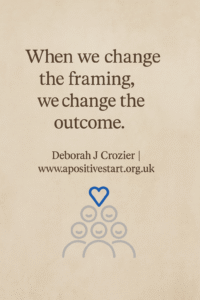There’s a line that has been echoing in me ever since I read it:
“Your body knows what to do. Your body is wise.” — Yuki Askew – a comment on one of my posts.
It spoke to a truth I have lived, witnessed, and now teach every day.
The Body Speaks Before the Mind Does
There were moments in my life when the dynamics in an environment shifted and, before I had words or conscious awareness, my body knew.
Every cell pulled me to run.
Not a thought.
Not a choice.
A full-body survival instinct.
Some call that a “disorder.”
I call it miraculous early intervention — my body sensing danger long before my mind could register it. That instinct has saved my life more than once. It can feel almost otherworldly, an ancient intelligence rising up to protect me.
And I see this same wisdom constantly in the clients I support.
When I offer grounding techniques, tapping sequences, or simply placing a hand on the heart, I often hear:
“Oh… I already do that naturally.”
“I didn’t realise why that helps me.”
People choose certain music or particular hertz frequencies without knowing the science behind it. They simply say:
“It soothes me.”
Their bodies chose what their minds didn’t yet understand.
Because the body is always trying to regulate, restore balance, and return to safety — often long before we have the language for it.
Where the Real Pain Begins: The Framing
The problem is not the body.
The problem is how people interpret what the body does.
In my own experience, that instinct to run — a profoundly intelligent protective response — was framed as pathology.
And when a survival instinct is labelled as something “wrong,” the person stops trusting themselves.
They shrink.
They hide.
They feel ashamed of the very thing that kept them alive.
It wasn’t the reaction that created the prolonged suffering.
It was the framing of the reaction.
And I see this in so many others:
- A protective instinct becomes “avoidant.”
- A freeze response becomes “lazy.”
- A shutdown becomes “uncooperative.”
- A fear response becomes “dramatic.”
Misunderstanding becomes the second wound — sometimes deeper than the first.
The Impact of Language: What Does “Disorder” Mean When You Already Fear You’re Failing?
This is where language matters more than we realise.
Think about the word “disorder.”
What does that mean to a human being who already fears they’re not coping?
Who already wonders if they’re failing at life?
Who already feels different, overwhelmed, or out of place?
A word like “disorder” can confirm someone’s deepest fear:
“There is something wrong with me.”
But what if the response isn’t disordered at all?
What if it is the exact order the body needed in that moment to survive?
When language frames a survival response as pathology, people internalise shame.
When language frames it as protection, people reclaim self-trust.
The meaning we assign determines the story we live.
Why We Cling to Labels
There’s another truth we rarely talk about:
People often accept labels quickly because they finally provide a reason for what they’ve been fighting alone.
A diagnosis can feel like relief when you’ve spent years being misunderstood — especially when the alternative has been judgment or dismissal.
But imagine if the initial framing had been compassionate and accurate.
Imagine if we already recognised these reactions as the body’s attempt to protect, communicate, and survive.
We wouldn’t need a label to “justify” behaviour.
There would be nothing to justify.
We would already understand.
Ancient Wisdom Modern Science Is Only Just Catching Up With
Long before neuroscience, cultures across the world understood the intelligence of the body:
- Indigenous traditions used rhythm, song, movement, and drumming to create safety and connection.
- African healing systems used call-and-response and communal rhythm to regulate the nervous system.
- Ayurveda emphasised breath, prana, and the inseparable link between body and emotion.
- Traditional Chinese Medicine treated emotions, breath, and organ health as one system.
- Japanese forest bathing (Shinrin-yoku) is now shown to reduce cortisol and activate the parasympathetic nervous system.
Today, polyvagal theory, somatic trauma work, and neuroscience are validating what ancient wisdom always knew:
The body finds a way.
The body remembers.
The body protects.
The body leads.
Imagine If We Framed It Differently
What if our response to someone’s overwhelm wasn’t judgement but curiosity?
What if we said:
“Your body is signalling something important.”
“This reaction has a history.”
“Your nervous system is protecting you.”
“What did your body know before your mind caught up?”
Everything changes:
People stop hiding.
Self-trust begins to return.
Shame loses its grip.
And healing becomes possible — not through force, but through understanding.
When We Change the Framing, We Change the Outcome
My own journey would have looked very different if my earliest instincts had been seen as protection, not pathology.
And that’s why this work matters so deeply to me.
When we honour the wisdom of the body and choose language that reflects truth rather than judgement, we create conditions where healing becomes not only possible — but inevitable.
The body is not the problem.
The body is the guide.
And when we change the framing, we truly do change the outcome.
Positive outcomes begin with – A Positive Start
